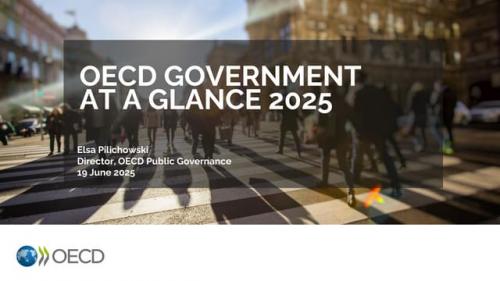
https://www.oecd.org/en/publications/government-at-a-glance-2025_0efd0bc...
Governments face a highly complex operating environment marked by major demographic, environmental, and digital shifts, alongside low trust and constrained fiscal space.
Responding effectively means concentrating efforts on three fronts: Enhancing individuals’ sense of dignity in their interactions with government, restoring a sense of security amid rapid societal and economic changes, and improving government efficiency and effectiveness to help boost productivity in the economy, while restoring public finances. These priorities converge in the governance of the green transition.
Government at a Glance 2025 offers evidence-based tools to tackle these long-term challenges.
High deficits underscore limited fiscal space post-pandemic
Economic issues are at the forefront of citizens’ minds, yet governments must respond in a challenging fiscal landscape. In 2023, the average fiscal deficit in OECD countries reached 4.6% of GDP, up from 2.9% in the years preceding the COVID-19 pandemic (2015-2019). Addressing complex, long-term challenges will require strategic management of constrained resources within this limited fiscal space.
Governments are intensifying efforts to prioritise the needs of the people in public services
OECD countries are increasingly redesigning how they deliver public services to place users at the centre. Of the 28 countries surveyed, 20 are adopting service design approaches based on the life-events experienced by citizens. This means that the administrative services are organised around key life events, such as having a baby, losing a loved one, retiring or starting a business. However, only 13 countries have fully integrated services for at least one life event, enabling users to interact through a single entry point for the entire life event.
Stakeholder engagement is stalling but broader deliberative democratic initiatives are growing
Among OECD countries, the average quality of stakeholder engagement in primary lawmaking improved slightly, rising from 2.0 in 2014 to 2.3 in 2024 on a scale of 0 to 4. In addition to traditional mechanisms, governments can also employ deliberative democratic practices—such as citizens' assemblies, juries, and public dialogues—to address complex or long-term policy challenges. Between 1979 and 2023, the OECD recorded 716 such processes, with 20% (148) occurring between 2021 and 2023.
Governments are not yet making the most of digital tools and data to improve effectiveness and efficiency
Data, digital tools and AI all offer the prospect of efficiency gains. OECD countries score, on average, 0.61 on the Digital Government Index (on a 0-1 scale) but could improve their digital policy frameworks, whole-of-government approaches and use of data as a strategic asset. On average, only 47% of OECD governments’ high-value datasets are openly available, falling to just 37% in education and 42% in health and social welfare.
The green transition still demands significant progress in government tools and policies
Governing for the green transition will require sustained long-term commitment, enhanced institutional capabilities, and broad societal consensus. Among various tools, green public procurement (GPP) frameworks have been adopted by 35 of the 38 OECD countries. However, only 3 countries have developed methodologies to measure procurement practices’ environmental impact—such as CO₂ emissions saved—while another 11 are in the process of doing so.









